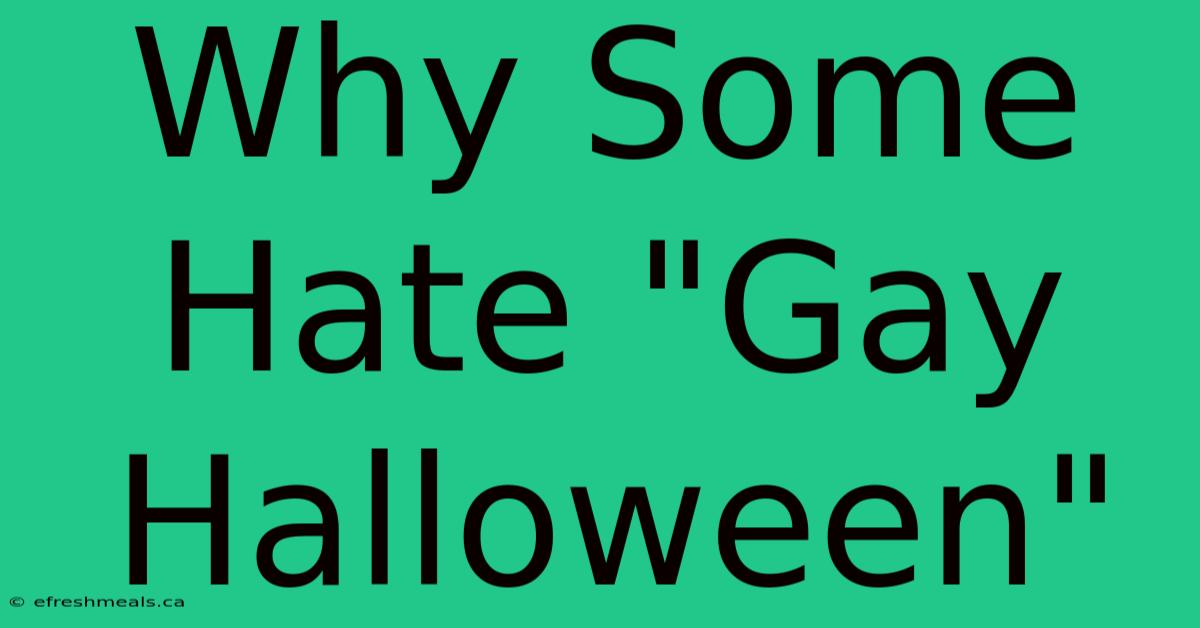Why Some Hate "Gay Halloween"

Discover more detailed and exciting information on our website. Click the link below to start your adventure: Visit Best Website nimila.me. Don't miss out!
Table of Contents
Why Some Hate "Gay Halloween"
Editor's Note: The term "Gay Halloween" has been a source of debate and even anger in recent years. Why do some people feel so strongly against it?
Why It Matters: The term "Gay Halloween" can be seen as a microcosm of larger issues around LGBTQ+ representation and acceptance. It highlights the ongoing struggle for inclusivity and the challenges faced by marginalized communities in navigating societal norms and expectations. This article will delve into the complexities of the term and explore the reasons behind its controversial nature.
Key Takeaways of Gay Halloween:
| Takeaway | Explanation |
|---|---|
| Appropriation of LGBTQ+ Culture | The term can be seen as appropriating LGBTQ+ culture for commercial purposes. |
| Stereotyping and Reducing LGBTQ+ Identity | The term reinforces negative stereotypes and reduces LGBTQ+ individuals to a single aspect. |
| Lack of Sensitivity and Understanding | The term can be hurtful and offensive to LGBTQ+ individuals and their allies. |
"Gay Halloween"
The term "Gay Halloween" emerged in the 2010s, primarily in online spaces, as a way to describe Halloween celebrations that catered to the LGBTQ+ community. While intended to be a fun and inclusive celebration, it has sparked controversy for several reasons.
Appropriation of LGBTQ+ Culture
One of the main criticisms of the term "Gay Halloween" is that it appropriates LGBTQ+ culture for commercial purposes. Many argue that the term is used to market and sell products, without genuine consideration for the struggles and realities faced by LGBTQ+ individuals. This commercialization can be seen as exploiting a marginalized community for profit.
Stereotyping and Reducing LGBTQ+ Identity
Using the term "Gay Halloween" perpetuates stereotypes about LGBTQ+ individuals. It reinforces the idea that LGBTQ+ people are only interested in certain themes or activities, reducing their identity to a single aspect. This kind of categorization ignores the diversity and complexity of the LGBTQ+ community and contributes to a narrow and often inaccurate representation.
Lack of Sensitivity and Understanding
The term "Gay Halloween" can be hurtful and offensive to LGBTQ+ individuals and their allies. It fails to acknowledge the history of discrimination and prejudice faced by the LGBTQ+ community. Using the term can feel disrespectful and insensitive, especially considering the ongoing fight for equality and acceptance.
The Impact of "Gay Halloween"
The use of the term "Gay Halloween" has a real impact on how LGBTQ+ individuals are perceived and treated. It reinforces the idea that LGBTQ+ people are different and separate from mainstream society, contributing to feelings of exclusion and marginalization. This can lead to negative experiences for LGBTQ+ individuals, ranging from casual discrimination to physical violence.
Beyond "Gay Halloween"
It's important to remember that the debate over "Gay Halloween" is not just about a single term. It's about creating a more inclusive and equitable world for everyone, regardless of their sexual orientation or gender identity. Instead of relying on labels and stereotypes, we should strive for genuine representation and understanding.
FAQ
Q: What are some alternatives to "Gay Halloween"?
A: Instead of using terms like "Gay Halloween," focus on promoting LGBTQ+ inclusion in all aspects of Halloween celebrations. Emphasize themes of acceptance, diversity, and representation.
Q: Why is it important to be sensitive to the language used around LGBTQ+ issues?
**A: ** Language plays a significant role in shaping our understanding of the world. Using inclusive and respectful language is crucial in creating a safe and welcoming environment for everyone.
Q: What can I do to promote LGBTQ+ inclusion during Halloween?
A: Support LGBTQ+ businesses and organizations, attend events that celebrate diversity, and engage in conversations that challenge prejudice and discrimination.
Tips for Celebrating Halloween Inclusively:
- Avoid stereotypes and generalizations: Choose costumes and themes that are inclusive and respectful of all identities.
- Amplify diverse voices: Highlight LGBTQ+ creators and artists in your Halloween celebrations.
- Create a welcoming atmosphere: Ensure your Halloween events are safe and welcoming for everyone.
- Challenge harmful language: Speak out against language that perpetuates stereotypes and discrimination.
- Promote understanding: Educate yourself and others about the LGBTQ+ community and its history.
Summary by "Gay Halloween":
The term "Gay Halloween" can be hurtful and perpetuate negative stereotypes. It's essential to use inclusive and respectful language when discussing LGBTQ+ issues. By focusing on promoting understanding and celebrating diversity, we can create a more welcoming and inclusive world for everyone.
Closing Message: As we navigate the complexities of celebrating Halloween in an increasingly diverse society, let's remember that our actions and language have real consequences. By promoting understanding and challenging harmful stereotypes, we can move towards a more inclusive and equitable world for all.

Thank you for visiting our website wich cover about Why Some Hate "Gay Halloween". We hope the information provided has been useful to you. Feel free to contact us if you have any questions or need further assistance. See you next time and dont miss to bookmark.
Featured Posts
-
Rapper Young Thug Gets Time Served Sentence
Nov 01, 2024
-
Hwy 401 Crash In Essex County Opp Investigation
Nov 01, 2024
-
Hugh Grant From Rom Com To Villain
Nov 01, 2024
-
Hugh Grant Unexpectedly Convincing Villain
Nov 01, 2024
-
Halloween Fun For Dogs In Brussels
Nov 01, 2024
